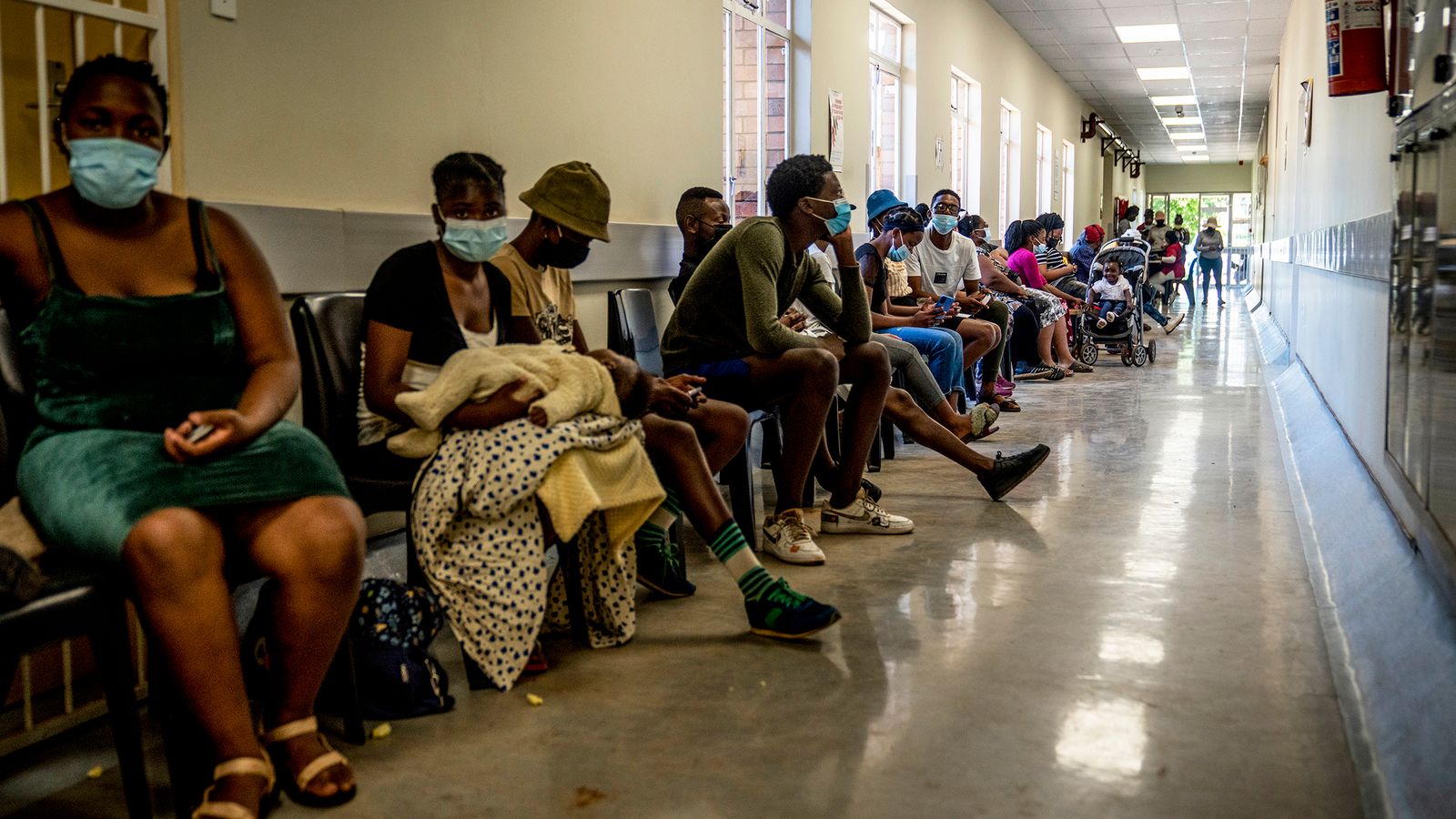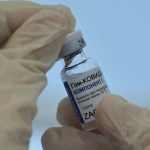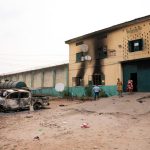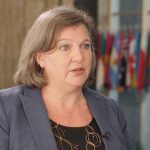Doctors treating people in the region of South Africa where Omicron is surging have told Sky News they have seen a rise in the number of patients being reinfected and vaccinated patients catching COVID-19.
Rates in the Gauteng region, particularly around Pretoria, have rocketed in the last few weeks as the Omicron variant has started to replace Delta nationwide.
But the GPs Sky spoke to confirmed reports from the World Health Organisation that in most cases, so far, those affected by South Africa’s fourth wave of COVID are presenting “mild” symptoms, rather than severe ones.
Dr Sheri Fanaroff, a GP at a private practice and founder of the Gauteng GPs Collective, said: “What we are seeing are a lot of patients getting infected again, both vaccinated and unvaccinated patients.
‘Good news’ emerges in early Omicron data | latest COVID updates here
“So far, the infections we are seeing are very mild. I am not aware of any patients with severe illness at the moment,” said the doctor, whose patients are “mostly all vaccinated”.
“I am sure there are some but on the ground, at the moment, people are presenting… with sore throats, coughing with fevers, with body pain… viral type of symptoms,” she added.
COVID-19: UK records 53,945 new cases and 141 more deaths in highest daily infections figure since spike after Euros in July
COVID-19: Mandatory jabs considered in Germany from February as tougher restrictions brought in for unvaccinated
COVID-19: ‘No need’ to cancel Christmas parties, says Boris Johnson after ministers’ mixed messages
“It is still too early to make an assumption because with other strains we saw… more severe illness [occurs] in the second or third week.
“I have an 80-year-old with underlying cardiac disease, he is not well generally. He is on day seven of COVID and doing quite well. All my elderly patients have something… so far they are mild which is the same as what I am hearing from other GPs on the ground in Johannesburg.”
Her observations were echoed by Dr Bhadrashil Modi, another GP, whose practice is in downtown Johannesburg, another city in Gauteng.
He told Sky News: “There has been an increase week on week.
“Two weeks ago, we were hardly seeing COVID patients, maybe one a week. And then last week it started increasing and we were seeing two or three COVID positive patients a day and then this week it skyrocketed and we saw more than ten or fifteen COVID positive patients a day.
“[The] COVID [patients are getting] has not really changed much… the typical symptoms that people are presenting are severe headache, severe body pain, sore throat, maybe a bit of a runny nose, and maybe a cough. There is also a very sudden onset… people are very aware of the approximate time that things started.
“Within a day you just start feeling terrible like a very bad flu, almost like a truck ran over you. That kind of pains but it’s not any different from the previous waves.”
Please use Chrome browser for a more accessible video player
Dr Modi said many of the younger patients at his practice were not vaccinated, reflecting the national picture in South Africa, but older ones were more likely to have had the jab.
He said most of the patients he was seeing were unvaccinated, but among those who had been inoculated, the symptoms were “a bit milder”.
Neither doctor was seeing a rise in the number of patients having to go to hospital, but both said it was too early to draw conclusions as it often takes several weeks before symptoms can deteriorate.
Please use Chrome browser for a more accessible video player
Both also said there were no signs at this stage that infants were being unduly affected, as suggested by media reports earlier in the week which said that children under two were accounting for an unexpectedly large proportion of COVID cases.
Dr Fanaroff said: “I know some of the reports coming out of South Africa say that it is affecting mainly only young people, [but] it’s not really what we are seeing as GPs in Johannesburg. We are seeing it affect a whole spectrum.”
Although there is no official data yet available, in the past couple of days, doctors and health chiefs from Botswana, Scotland and other parts of South Africa have also suggested that the variant may be no more likely to result in the need for hospital treatment.
The views of the South African doctors Sky spoke to mirrored the reflections of senior South African health officials.
Barry Schoub, chair of the South African government’s committee on COVID vaccines, told Sky News: “At this stage, the news does look to be promising – the great majority of the breakthrough infection (in other words, individuals that have had infection despite vaccination) is mild.”
Please use Chrome browser for a more accessible video player
Rather than the severity, it is the speed of the spread of Omicron that stands out at this stage, experts say.
One scientist with the South African National Institute for Communicable Diseases (NICD) who spoke in a WHO news conference on Thursday, Professor Anne van Gottberg, said she expected the number of daily cases to top 10,000 today, having risen from 8,561 on Wednesday and 4,373 on Tuesday.
She told the news conference: “Most of these cases are in Gauteng. However, in all of our provinces, we are seeing an increase in the percentage testing positive… and we think that the numbers of cases are going to increase in these provinces.
“Our last reproduction number shows that the reproduction number for South Africa, nationally, has increased and in several other provinces was increasing.”
Scientists from South Africa and neighbouring Botswana were the first to raise the alarm about the new variant spreading rapidly in their regions.
Please use Chrome browser for a more accessible video player
The warning was issued as some of the districts around Pretoria began to see large, sudden rises in the numbers of people testing positive.
Sequencing of some of those cases found a new variant, which the World Health Organisation later designated a Variant of Concern and called Omicron.
The latest data, according to Professor van Gottberg, found that out of the 249 samples the authorities had been able to sequence in November, 183 were Omicron – around 75%.
Omicron was only first identified in samples taken around 11-13 November, and in the previous months the vast majority were Delta variant.
It has since been identified in more than two dozen countries, including the UK, US, France and India.






















